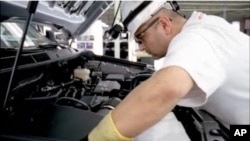Japanese automaker Toyota has announced yet another recall. This time it is Tacoma pickup trucks sold in the United Sates. The announcement is the latest in a string of recalls that have hurt the company's image, and prompted concern among many in Japan.
The Toyota brand is an icon in Japan. Its global success is a source of national pride. So when the automaker announced plans to stop selling millions of its cars in the United States and Europe last month because of gas pedal defects, the Japanese were concerned. When the company expanded its recalls to Japan, the public reacted with disbelief.
Toyota was founded in the early 1930s but the its real success came after World War II when it developed something called "The Toyota Production System." The system focused on "kaizen" or continuous improvements. It called for flexibility on assembly lines, and mandated that problems be fixed as soon as they were discovered so mistakes would not be repeated.
Quality and reliability became Toyota's selling point. But with defective brakes, sticky gas pedals, and loose floor mats prompting recalls of Toyota cars worldwide, that reputation is falling fast.
Jeff Kingston teaches modern Japanese history at the Temple University branch in Tokyo. He says the company has lost its way.
"I think they've grown complacent, resting on their laurels," he noted. "I think their management system is antiquated. We've seen how slow decision making can be."
Kingston says the company waited too long to respond to the problems. It took weeks for Toyota President Akio Toyoda to speak publicly about the recalls. When he did hold a news conference, he apologized for "inconveniencing the customers." He also has vowed to "redouble the company's commitment to quality."
Kingston says that apology was not enough.
"Toyota has failed to measure up to international standards; it's also failed to measure up to Japanese expectations," he added.
Toyota's problems come amid a growing number of complaints, accidents, recalls and financial problems for several leading Japanese companies. The spike in complaints is partly the result of a new law that requires Japanese companies to report serious product-related accidents.
Government reports also say the number of domestic car recalls doubled between 2004 and 2008, compared with the previous five years. Last week, Honda recalled more than 400,000 cars worldwide because of defective air bags.
Waseda University Finance Professor Yukio Noguchi says Toyota's problems are a sign of arrogance, after years of global success. But he says it is unfair to compare its problems with those of other Japanese companies.
"This problem is a very special problem and you cannot draw general conclusions from this about Japanese manufacturers as a whole," he explained.
Toyota is trying to restore its image with a massive public relations campaign. The company has placed full-page ads in newspapers and is airing TV commercials in the U.S., vowing to put quality and customers first.
But Kingston says Toyota must go further than that. He says the company must become more transparent and accountable, and reconnect with customers.
"Look at [South] 5-Korean companies," added Kingston. "Look at how they're charging ahead. Look at how they've got that competitive edge. Japan needs to regain that."
With increasing competition from South Korea, Kingston says Toyota and other Japanese companies must change fast.




